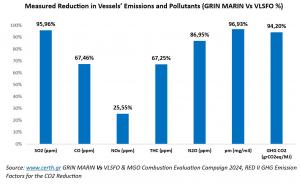New Synthetic Biofuel Promises to Address the Marine Industry’s IMO and FuelEU Maritime Emission Restrictions For Good
GRIN MARIN is a synthetic marine biofuel that dramatically drops all engine emissions. Being Plug-In, it can be burnt without any changes in the vessel engine.
GRIN MARIN is a synthetic, ester and RFNBO (Renewable Fuel of Non Biological Origin) based biofuel developed especially for the needs of modern vessels, with its producer stressing that it is not FAME biodiesel. With 100% of its raw material and energy being renewable, its key characteristic is that it chemically behaves like fossil fuel. Meeting as a standalone the specification of ISO 8217:2017 Distillate Marine Petroleum, it has the chemical behavior of traditional MGO (Marine Gasoil). Among other advantages, this offers an ultra-high calorific value of +42MJ/kg, at the time when a traditional FAME biodiesel would yield 15% less energy, hence less mileage.
In terms of emission drops, GRIN MARIN demonstrated staggering performance in all tests from certified laboratories and renown institutes in its 8 year-long development course. It is classified as a NEAR ZERO CARBON fuel, reducing carbon emissions by more than 94%. Moreover, reports demonstrated drops in all other crucial pollutants, eg SO2 reduction by 96%, N20 by 86% or the black smog of pm (particulate matters) by 97% when compared with real time combustion of VLSFO. There was even a drop in NOx emissions by 25%, when FAME biodiesel is at the same widely reported to raise NOx.
According to the manufacturer, production has already begun in its Ritsona Greece 10k MT/year strong pilot factory, while distribution is expected to start by August 2025. An extension of capacity to a yearly 40k MT is expected within 2026, and plans are for a good 150k MT/year unit by end of 2028.
The fuel is already entered in EU, classes’ and RED nomenclature, with important global fleets having it in their radar for use on their seagoing vessels.
Learn more about GRIN MARIN on Youtube
About Tailors Group
Tailors Group is a modern Greek based organization that operates in the Southern European Market of green fuels, oils and oleochemicals.
Started in 2007 as a personal company, the group is now a major player in biofuels, glycerin and oils. Its industrial experience and commitment to innovation and R&D, lead to the creation of GRIN MARIN, a revolutionary sustainable green petroleum.
For information or inquiries visit Tailors' website
Panagiotis Aggelis
Tailors Energy SA
+30 21 6900 1071
paggelis@tailorsgroup.gr
Legal Disclaimer:
EIN Presswire provides this news content "as is" without warranty of any kind. We do not accept any responsibility or liability for the accuracy, content, images, videos, licenses, completeness, legality, or reliability of the information contained in this article. If you have any complaints or copyright issues related to this article, kindly contact the author above.
Wytrwal Industries Celebrates 250 years of the U.S. Army
WHAT by Anthony Prebor Expands the Acclaimed ?: QUESTION Mystery Series
DRML Miner Expands Cloud Mining Services with Sustainable Infrastructure and Flexible Contracts
Kalendarium
Więcej ważnych informacji
 Jedynka Newserii
Jedynka Newserii

 Jedynka Newserii
Jedynka Newserii

Prawo

Trwają dyskusje nad kształtem unijnego budżetu na lata 2028–2034. Mogą być rozbieżności w kwestii Funduszu Spójności czy dopłat dla rolników
Trwają prace nad wieloletnimi unijnymi ramami finansowymi (WRF), które określą priorytety wydatków UE na lata 2028–2034. W maju Parlament Europejski przegłosował rezolucję w sprawie swojego stanowiska w tej sprawie. Postulaty europarlamentarzystów mają zostać uwzględnione we wniosku Komisji Europejskiej w sprawie WRF, który zostanie opublikowany w lipcu 2025 roku. Wciąż jednak nie ma zgody miedzy państwami członkowskimi, m.in. w zakresie Funduszu Spójności czy budżetu na rolnictwo.
Konsument
35 proc. gospodarstw domowych nie stać na zakup mieszkania nawet na kredyt. Pomóc może wsparcie budownictwa społecznego i uwolnienie gruntów pod zabudowę

W Polsce co roku oddaje się do użytku ok. 200 tys. mieszkań, co oznacza, że w ciągu dekady teoretycznie potrzeby mieszkaniowe społeczeństwa mogłyby zostać zaspokojone. Jednak większość lokali budują deweloperzy na sprzedaż, a 35 proc. gospodarstw domowych nie stać na zakup nawet za pomocą kredytu. Jednocześnie ta grupa zarabia za dużo, by korzystać z mieszkania socjalnego i komunalnego. Zdaniem prof. Bartłomieja Marony z UEK zmniejszeniu skali problemu zaradzić może wyłącznie większa skala budownictwa społecznego zamiast wspierania kolejnymi programami zaciągania kredytów.
Problemy społeczne
Hejt w sieci dotyka coraz więcej dzieci w wieku szkolnym. Rzadko mówią o tym dorosłym

Coraz większa grupa dzieci zaczyna korzystać z internetu już w wieku siedmiu–ośmiu lat – wynika z raportu NASK „Nastolatki 3.0”. Wtedy też stykają się po raz pierwszy z hejtem, którego jest coraz więcej w mediach społecznościowych. Według raportu NASK ponad 2/3 młodych internautów uważa, że mowa nienawiści jest największym problemem w sieci. Co więcej, dzieci rzadko mówią o takich incydentach dorosłym, dlatego tym istotniejsze są narzędzia technologiczne służące ochronie najmłodszych.
Partner serwisu
Szkolenia

Akademia Newserii
Akademia Newserii to projekt, w ramach którego najlepsi polscy dziennikarze biznesowi, giełdowi oraz lifestylowi, a także szkoleniowcy z wieloletnim doświadczeniem dzielą się swoją wiedzą nt. pracy z mediami.









.gif)

 |
| |
| |
|